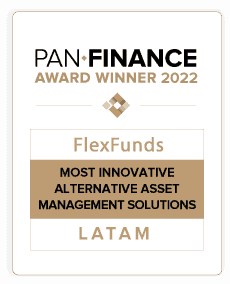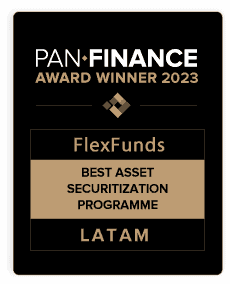- In this article, Pablo Gegalian, Regional Director of the Southern Cone at FlexFunds, explains why alternative assets are becoming increasingly relevant to asset managers, as detailed in the II Annual Report of the Asset Securitization Sector 2024-2025, developed by FlexFunds in collaboration with Funds Society.
- This information is aimed at fund managers and investment advisors who want to gain a deeper understanding of the three main benefits of alternative assets: diversification, versatility, and high returns.
- At FlexFunds, we offer an asset securitization program to issue exchange-traded products (ETPs) that facilitate the distribution of your investment strategy with alternative assets. For more information, don’t hesitate to contact our team of experts.
Alternative assets are those that are not included in traditional asset classes like stocks, bonds, and cash. These are gaining more and more importance in the portfolio management environment.
In fact, according to the II Annual Report of the Asset Securitization Sector 2024-2025, developed by FlexFunds in collaboration with Funds Society, most of the managers surveyed allocate up to 20% of their portfolios to these assets, and 17% assign more than 30%.
Considering these statistics, Pablo Gegalian, Regional Director of the Southern Cone at FlexFunds, explains why alternative assets are important to fund managers and what benefits they offer.
Diversification
First, Gegalian explains that one of the main advantages of alternative assets is their ability to diversify investment portfolios.
Traditional assets typically show similar market behavior, but alternative assets often have a low correlation with these conventional classes.
“For example, real estate often behaves differently from stocks and bonds, providing a stabilizing effect during market downturns. This diversification can reduce the overall portfolio risk and improve returns over time,” Gegalian mentioned.
Versatility
On the other hand, alternative assets are highly versatile, offering different risk-return profiles that can be tailored to fit various investor preferences.
For example, according to the FlexFunds specialist, private equity investments can generate substantial returns, but they come with higher risks and longer investment horizons.
Conversely, real estate investments can provide steady income streams through rental yields while also offering the potential for capital appreciation.
For this reason, as highlighted in the II Annual Report of the Asset Securitization Sector 2024-2025, 39% of managers focus on real estate as an alternative asset, while 29% focus on private equity funds.
High returns and risk
Additionally, alternative assets are seeing increased allocation due to their potential to offer high returns, especially when it comes to private equity. It’s important to mention that this type of asset brings higher risk and lower liquidity, so not all investors qualify for it.
Specifically, Gegalian highlighted a study by Cambridge Associates that found that the median internal rate of return (IRR) for private equity over the past 20 years was around 13%, a figure far exceeding the returns of listed equity markets.
“Investment managers often acquire undervalued companies, improve their operations, and ultimately sell them at a higher price,” the expert stated.
Something similar happens with hedge funds, which employ sophisticated strategies to exploit market inefficiencies, and digital assets like cryptocurrencies bitcoin and ethereum.
A promising future
Looking ahead, Gegalian believes the outlook for alternative assets remains promising, especially as more institutional investors are allocating a portion of their portfolios to this type of investment.
Among the reasons for this optimism are the low-interest rate environment, the desire for diversification, and the greater accessibility of alternative assets thanks to advances in financial vehicles.
“For example, exchange-traded products (ETPs), like those offered by FlexFunds, can provide fractional ownership of real estate or private equity investments, reducing barriers and entry costs, and allowing a wider range of investors to participate in these markets,” Gegalian concluded.
High potential returns are normally accompanied by high risk and low liquidity, as is the case with alternative assets. Expert advice must always be sought before making any investment decisions.It’s worth noting that the II Annual Report of the Asset Securitization Sector 2024-2025 by FlexFunds can be downloaded easily and for free in just a few clicks.







